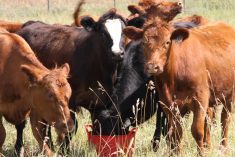CALGARY – Alberta’s goal to build up its value-added food markets to $20 billion in sales within 10 years will need a boost if the province hopes to succeed.
The provincial government’s recent study, called Changing Course, The Value-Added Agri-Food and Fibre Strategy for Alberta, says the province risks falling behind other regions where food and fibre processing are gaining a stronghold.
Alberta produces $5.6 billion a year worth of food and beverages. If it doesn’t develop a more aggressive approach to research, development and marketing, that figure will decline, the report said.
Read Also

Animal protection delivery to change in Saskatchewan
The Saskatchewan government is looking for a new agency to handle animal welfare after Animal Protection Services of Saskatchewan decided not to renew its contract next year.
Written by Toma and Bouma Management Consultants and the George Morris Centre, the study recommends forming a corporation to guide the province into more value-added development.
The report proposed a strategy meeting this fall with producer groups and industry associations, with guidance from Alberta Agriculture. The goal would be to set up a non-profit independent corporation that would cost about $12 million. Start-up money could come from the federal and provincial governments as well as industry.
In its analysis of the food and beverage industry, the study sees the meat industry, particularly beef and pork, continuing to lead the way in sales. Oilseeds, poultry, dairy products and processed foods also have potential.
There are factors holding Alberta back.
The report said supply-managed systems for dairy, poultry, pork and single-desk selling for pork, wheat and barley discourage local investment in value-added processing.
Another restraint is the focus on large commodities, which discourages further development of small food processors.
There is also a general lack of knowledge and research about the food processing industry and limited knowledge about gaining extra value from foods for the pharmaceutical and industrial sectors.
The report identified Alberta as a good place to develop a business because of lower personal and corporate tax rates, competitive costs like land and utilities and closeness to major markets.
The biggest problem in encouraging business to start here or relocate is lack of awareness about advantages in the province. There is a perceived problem with high transportation costs and a sense the population isn’t large enough to support a strong local market.
Another suggestion is to encourage training for staff. The norm in the food processing industry has been to learn a job from scratch.
Finding buyers for Alberta products is also difficult. The report said many small processors serve their local area and don’t know enough about marketing or expansion.















